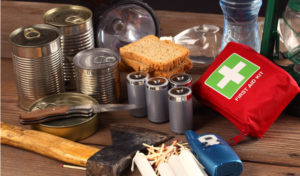
Originally posted on November 22, 2017.
I’ve been writing to you for years now with one major goal; getting you to think about your own survival situation. Your broad spectrum survival needs are something you should be considering on a regular basis. Income, investment, food and water, and all other aspects of preparation. As with any aspect of life, there’s an industry out there attempting to profit from it. That’s a good thing of course. Americans focused on survival are offered a variety of options to achieve their goals. It’s important to remember that the survival industry, like any other, wants you to buy its products. It’s up to you to do some due diligence before you spend your hard earned dollars on survival prep.
One of the biggest names in the survival industry is Wise Inc., maker of survival foods. Bloomberg recently profiled Wise’s CEO Aaron Jackson. The resulting article is an interesting look into the workings of the survival industry, and into how Wise and other companies like it are raising awareness about survival preparation and changing the image of survival prep from “doomsday” to everyday. Amanda Little writes:
Jackson first connected with Wise in 2012, when a headhunter tried to recruit him from Post to run the fast-growing startup. He declined the offer, but commenced some research. “My aha! came in mid-2012 when I read that more than half of American homes have first-aid kits on hand, along with fire extinguishers and flashlights. I realized then they haven’t added the food component. I saw incredible growth potential.” When the headhunter extended the offer again a few months later, Jackson accepted the job of CEO and cautiously started to shift the marketing focus to his ideal customer, one who looks less like Ted Kaczynski and more like himself, his wife, who’s an attorney, and their two tweens: someone who isn’t entirely convinced that humanity is hurtling toward annihilation but who’s willing to stock the pantry with a Mylar-fortified food supply just in case. “This is the food equivalent of life insurance—staples that every American household in this age of uncertainty should have,” he says.
Jackson hired a young designer who’d been at the surf company Quiksilver to revamp the packaging. “We’d been selling our products in large, black plastic tubs. We needed something that doesn’t scream doomsday, so we moved to clean white boxes, contemporary fonts, high-quality food images—packaging that makes sense on a Target shelf,” Jackson says. As orders came in from big-box stores, he added a manufacturing facility a 15-minute drive from the office (production had previously been outsourced) that can produce 25 million pouches a year.
In the past four months, the spate of natural disasters combined with the specter of nuclear war with North Korea has pushed up Wise’s total sales 40 percent from the previous four-month period. Concerned suburbanites as well as disaster responders have contributed to the increase. The factory has made it possible for Jackson to meet both sudden surges and steady growth in demand. He ultimately managed to ship the 2 million servings to FEMA in a matter of weeks, with only a brief disruption to his regular customers’ supply.
In four years, Wise’s annual retail sales have more than doubled, to about $75 million. Using his network of former clients, Jackson persuaded Wal-Mart Stores, Target, Home Depot, and Bed Bath & Beyond to carry Wise products. In 2014 he also persuaded Home Shopping Network to feature the company’s wares; the TV network has become its biggest distributor. But at this point, only 2 percent of Americans have bought into survival foods, according to industry analysis. Wise’s two main competitors, Emergency Essentials LLC and Mountain House are, like all companies in the industry, privately held and don’t report sales data, but Jackson estimates that survival food sales total about $400 million annually. Jackson sees the survival food industry today where the organics industry was in the 1950s before Americans got nervous about pesticides—poised to explode. Still, Darren Seifer, a food and beverage analyst at NPD Group, cautions the industry could just as easily “remain on the fringe, gathering dust on pantry shelves.”
Read more here.



